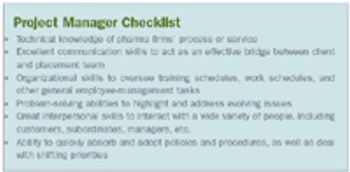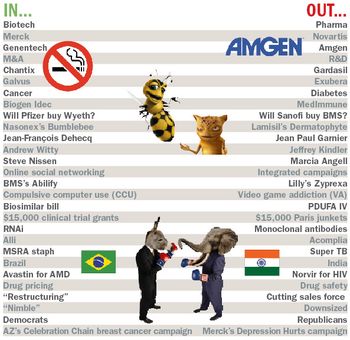
Pharma defends itself against claims made in charity's report on drug access for the world's poor

Pharma defends itself against claims made in charity's report on drug access for the world's poor

A new report says FDA is desperately behind on science. At last, a critique we can actually do something about. But will we?

Economist Conference, Pharma 2020

When it comes to clinical teams, the question of whether or not to outsource brings some untraditional answers

Pharma companies would do well to proceed with extreme caution when entering the blogosphere

GlaxoSmithKline locks up MediaCom as its only ad-buying/planning provider. The agency will handle GSK's massive ad spend, which last year hovered around $1.1 billion.

Drug manufacturer shakes things up with new Web site that functions as an open book into the world of Vertex Pharmaceuticals. The company hopes that its transparent approach to design will be a lesson to pharma companies still fearful of online media.

European Sales Manager

The European CRO industry is becoming more competitive and complex by the day. What will it take to remain successful in this rapidly evolving landscape? Alan Morgan investigates.

Science is the lifeblood of pharma, of course. But these days, science isn't just what you produce in your own labs. It's what you can license, buy, partner on, or gain through acquisition. Which means that, increasingly, deals are the lifeblood of pharma.

One of industry's main complaints is that delaying the introduction of new medicines is a particularly simple way of saving money

In August, eMarketer reported that Internet ad sales had officially displaced radio ad sales, nabbing the slot of fourth-largest ad medium. That was a huge blow to radio, which receives a sizable chunk of ad dollars from the pharma industry. Now pharma marketers have a new option-ReachMD, a 24-hour satellite radio station that plays content targeted at doctors.

The ultimate goal is for the medical system to develop new evidence as a natural by-product of delivering appropriate care

It's that time of year again, when Santas everywhere take stock of nice and naughty in order to fill stockings-and magazines make up their lists of hits and has-beens.

A crush of Phase III failures triggered an R&D turnaround at AstraZeneca


TKTKTKTKTKTK

Abbott Laboratories has received a positive opinion recommending approval of Humira (adalimumab) for the treatment of moderate to severe plaque psoriasis.







At the recent eyeforpharma Marketing ROI conference in Barcelona, one thing struck me forcefully: just how far behind the times the pharma industry is lagging.





Safety Risks, Generic Threat Scale Down Big Hopes